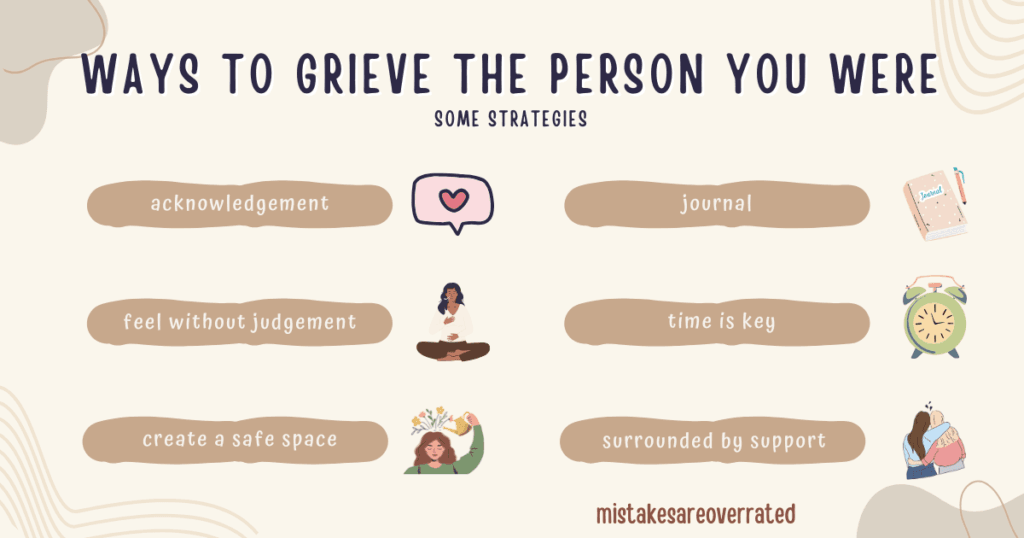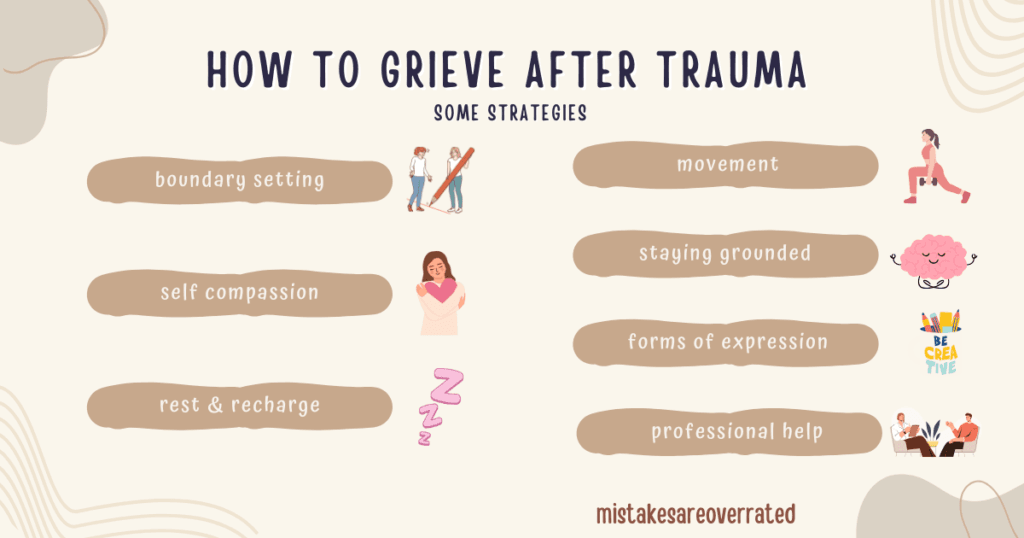
*content warning* please be advised this article contains discussion of trauma, grief, dissociation, triggers, assault and recommendation of deep internal work that may bring up some buried emotions and memories. please read at your own discretion.
trauma can have a profound impact on us. it can affect us in all areas of our lives, and at times it can even completely change us as a person.
trauma can change the way we view ourselves, the world, the people around us, our values and beliefs.
we may feel disconnected from the person we once were, as if that version of ourself is just a distant memory.
a beneficial stage in our healing is, allowing ourselves to grieve.
grieving is a deeply personal process, one with no set timeline or manual to follow,
so we must make sure we take all the time we need in this stage.
allow yourself to grieve
i had a misconception with grief.
grief is not just a loss through death. grief can also stem from the loss of identity, trust, safety, or a sense of control.
after trauma it is important to allow ourselves to grieve the person we were before the event, or the life we had envisioned for ourself.
(you may still have the same future plans for yourself after trauma, but in my circumstance, everything changed so i had to grieve my previous ambitions)
please remember that there is no ‘right time’ for how long grieving should last.
what matters most, is we are allowing ourselves to have space to fully feel the grief, without rushing ourselves to move on.
we must be patient and trust that healing is possible, even if it doesn’t feel that way right now.
grieving the person you were before trauma
when trauma completely changes our perceptions of ourself and the world we live in, it is important to understand that this is grief.
this is a process that looks different for everyone, and many of us may not actually be aware we are infact grieving.
when we feel distant or disconnected from our identity, thoughts, memories and values, it can be extremely confusing and scary.
we may experience dissociation, where our brain tries to protect us from remembering the pain or trauma we have been through.
we may experience triggers, when a stimuli reminds our brain of our trauma and becomes distressed.
and we may feel completely lost in life, like we don’t know who we are anymore or what our purpose is.
please remember that these feelings are normal, and just know that healing is possible.
it took me close to a year to realise that what i was experiencing and feeling was grief.
once i acknowledged this loss, i was able to process it, and this helped my healing journey immensely.
how to grieve after a traumatic event – 13 strategies
trauma impacts everyone different, so how it effects one person may not be the same for you.
the same goes for grief. grief is a very personal process, so what helps one person may not necessarily help you.
these are 13 ways to help you grieve after experiencing trauma.

acknowledgement
trauma can cause us to push aside, deny or suppress our feelings, as they can cause us to feel distressed and overwhelmed.
but the first step in grieving is being able to recognise and acknowledge, that what we have been through is painful and difficult.
the emotions trauma can cause us to feel can be overpowering and intimidating, but acknowledging what we feel is a crucial step.
how do i do this? journaling, talking to someone, self talk, written exercises, meditation, creative expression.
feel without judgement
we must remove all judgments we have about certain emotions, feelings and thoughts, to allow ourselves to be vulnerable.
we must give ourselves permission to feel all of the emotions that arise within us, and a big part of this is becoming vulnerable with ourself.
grief isn’t just about feeling sad, (that is what i used to think).
it is about feeling, and being able to express, all of our emotions that arises from our trauma.
this may include anger, anxiety, self blame, guilt, numbness, shame, fear, shock or confusion.
no matter what emotion comes up within us, we must allow ourselves to feel them.
we must try not to suppress, force ourselves to feel certain ways or invalidate our emotions and feelings.
create a safe space
the world we live in today is fast paced, and it has a way of flying past us.
the busyness and distractions in everyday life can sometimes cause us to never make time to grieve.
it is essential for us to create safe, quiet spaces, where we have the time to reflect on our trauma and the emotional impact is has on us.
these spaces provide a sense of security and peace, that allow us to be comfortable, vulnerable and feel at ease.
also please know that safe spaces don’t have to be physical spaces, it’s where you are free to express yourself without judgment or fear.
how do i do this? a physical place (bedroom, beach, park, ect), a supportive friend or person, an object (weighted blanket, teddy, ect), a specific sound or smell or a quiet walk.
journal
write it out. write everything out.
feelings, thoughts, emotions, memories, progress, struggles, aspirations – just everything!
journaling can help us release what we have built up within, to navigate our way through our grief.
journaling creates an opportunity for us to find out who we truly are and helps us discover our true selves.
by expressing our true self in a healthy way, it allows us to understand what makes us unique.
i found journaling to be powerful in the sense that it allowed me to write down my true, deeply deeply buried emotions, as i felt i was safe.
it also provided me a space to write about the person i once was. the dreams i had that i didn’t get to achieve and the things i had lost in my life.
i have 10 downloadable deep journal prompts here if you are unsure of where to begin.
time is key
we have societal pressures on almost everything we do in life, from the way we look, our career success, family life, what we say, social status, ect.
another societal pressure we may feel is for us to “move on”, or appear “strong” after trauma.
it is so so so important for us to feel and navigate our way through our grief without any judgment or pressures.
we don’t need to “be over it”, go out with others when we aren’t ready, or get back to normalcy immediately.
please understand that healing takes time, be patient with yourself ♡
surrounded by support
we need to try to surround ourselves with those who provide a safe and non judgemental space for us.
this way we can be open, raw and vulnerable- all important aspects in allowing us to properly grieve.
grief can feel like a lonely and isolating journey at times, but connecting with others may help us.
social support can allow us to feel less lonely, find inspiration or motivation, hear others stories or recommendations, find healthy relationships, and feel a part of a community.
how do i do this? support group, a family member, organisation, therapist or mental health professional, or a trusted friend.
please know that if you’re not ready to share your trauma with others yet, that is okay and i completely understand.
just take your time and reach out when ever you feel you are ready, (it took me 6 months to tell anyone about what i experienced)

boundary setting
setting boundaries is a way of protecting our energy, time and peace.
through boundaries, we can provide ourselves the energy we need to take back our power and create space for our healing to take place.
we need to say “no” to what drains us, what we don’t enjoy, what we don’t want to do, or what has a negative impact or influence on us.
and we need to say “yes” to what uplifts us, allows us to heal, provides us opportunities for growth and empowerment.
i have an in-depth article on how to set healthy boundaries after trauma here if you would like to read it.
self compassion
we must be kind and gentle to ourselves as we navigate our way through the grief process.
one of the main roles self compassion plays in our journeys, is the positive relationship we gain with ourself.
knowing that we have our own back through all the ups and downs during our journey.
we must not be too hard on ourselves for feeling lost in the process, or not knowing ‘how to’ grieve.
grief is a process, so some days may feel easier, whilst others may feel overwhelming.
knowing we have our best interest at heart during our journey can truly make all the difference.
i have an in-depth article on how to engage in self compassion while healing from trauma here if you would like to read.
rest and recharge!
trauma is physically, mentally and emotionally exhausting.
and grieving requires alot of energy.
so it is absolutely essential for us to rest and take care of our bodies.
not providing ourselves time and space to rest can actually hinder our healing.
our healing thrives when we are nourished, well rested, and focus on our mental, physical and emotional needs.
how do i do this? a good nights sleep, eating nutritious food, stretch, take time off when needed, physical activity, meditation, shower, ect.
movement
movement and exercise, can be a powerful tool when it comes to navigating our way through grief.
particularly, i found movement out in nature to have profound benefits.
body movement helps increase endorphins (the natural mood boosters), build resilience, reduce stress, release and express emotions.
listening to our bodies is key in this, we must find ways we love to move our bodies, so we can show up daily.
i suggest trying out new ways of movement until you find something that makes you feel your best (and you actually enjoy!)
how do i do this? walking, dancing, cycling, swimming, hiking, team sport, individual sport, gym, pilates, boxing, workout classes, stairs, ect
staying grounded
engaging in activities that keep us grounded is helpful during our grieving process as it allows us to stay present.
when we focus on the present it allows us to create a sense of safety and stability.
feeling safe and stable is crucial to allow us to process our grief and help reduce the overwhelming emotions that come with this journey.
it is important for us to try out new grounding techniques to find what works best for us, to help us connect with our body and build resilience.
how do i do this? mindfulness, meditation, sensory grounding, prayer, self soothing tools, nature, scans, slowing down and being in the moment
forms of expression
finding the words to express our trauma can be difficult, and at times words alone can’t go into the depth of our grief.
this is when we can experiment with other forms of expression, so we can still release our emotions in healthy ways.
how do i do this? music (creating or listening to music we resonate with), art, drawing, photography, crafts, painting, poems, acting, journaling, letters, dancing, yoga, ect
i really, really struggled to talk about my grief to anyone, i felt i couldn’t really put how i felt into words, and i felt abit embarrassed.
i began expressing my grief into poems, and then i would read them out to those i was comfortable with sharing them to.
my poems are the deepest, most personal things to me, so it was very nerve racking to speak them to people, but once i did i felt a massive relief.
professional help

talking to a professional can be beneficial when navigating our way through grief and healing.
i highly advise you to seek professional help from a trained mental health or health professional
– a psychologist, psychiatrist, therapist or any trained professional of that sorts.
all of the information and strategies i am providing you with today is purely from personal experience and it should never constitute professional advice and should not be relied upon as such.
grief is a process
some times we don’t fully understand what we are feeling after experiencing trauma, or a traumatic experience, due to the conflicting opinions of others.
this is our personal journey, please remember that healing takes time.
we must make sure we don’t find ourselves in the harmful mindset of comparing ourselves and our journey to others.
grief is a natural, and essential part of our journey of healing from trauma.
i hope you know that you are not alone in this journey – there is support available for you.
whether it’s through therapy, reaching out to loved ones, friends or support groups, there are people out there who understand and care.
grieving and healing are personal experiences, but they are also experiences that are shared.
hold trust in yourself that you will be able to get through this grieving process in your own time.
you are amazing and more powerful than you realise.
i hope something resonated with you in this article,
as always if you want to contact us, our messages are always open 🤍
-mao

Leave a Reply